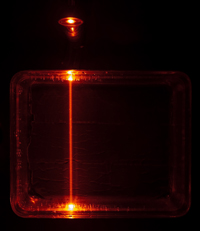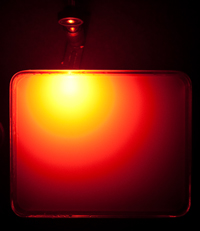in vivo Cancer Detection

Light focused on a clear plastic container filled with water travels straight.
Diffuse optical methods based on near-infrared light illumination have a great potential for detection and therapy monitoring of disease by providing information on several unique deep tissue functional/metabolic parameters. With diffuse optical spectroscopy and tomography (DOS & DOT), oxygenated hemoglobin, deoxygenated hemoglobin, water and lipid concentrations, and tissue scattering properties can be reconstructed. With diffuse correlation spectroscopy (DCS), blood flow information is accessible optically. DOT, DOS and DCS are non-invasive methods that are based on surface measurements.
On the other hand with minimal invasion, tissue micro-environment (e.g. vascular leakiness) or selective uptake of molecular targeted agent in the diseased tissue can be probed by measuring fluorescence signal of exogenous optical contrast agents. In addition to these unique functional parameters, diffuse optics utilize non-ionizing radiation (thus enabling frequent measurement), and low cost instrumentation. These features make diffuse optics suitable for providing complementary information to traditional clinical imaging modalities (e.g. X-ray, Ultrasound, MRI, PET/SPECT), and for monitoring progression or therapeutic response of a disease.

Near-infrared light focused on a turbid medium with similar optical
properties to tissue goes through multiple scattering events.
In our laboratory, we assess and improve the capabilities of diffuse optics in breast cancer detection, diagnosis and therapy monitoring. In clinical measurements of human breasts with tumor, we focus on identifying functional parameters which can serve as early indicators of therapy efficacy. Using a preclinical animal model, we study the metabolic mechanism of varied responses to therapy seen in the clinic, and investigate new therapeutic drugs and interventions. Also, we explore new functional and metabolic parameters (e.g. glucose metabolism) accessible through near-infrared fluorescent optical agents. In the near future, we plan to expand our research to different cancers (e.g. head & neck tumor, lymphoma) and to different organs (e.g. brain).
- Long-term tissue engineered periosteum-mediated allograft healing is hindered due to persistent fibrosis and limited allograft remodeling.; Bone reports; Vol 26, pp. 101865. 2025 Aug 06.
- Optimizing Tissue-Engineered Periosteum Biochemical Cues to Hasten Bone Allograft Healing.; Journal of biomedical materials research. Part A; Vol 113(3), pp. e37890. 2025 Mar.
- Leveraging the predictive power of a 3D in vitro vascularization screening assay for hydrogel-based tissue-engineered periosteum allograft healing.; Biomaterials advances; Vol 169, pp. 214187. 2025 Jan 15.
News
Affiliations
Contact Us
Choe Lab
MC 5-7223
601 Elmwood Ave
Rochester, NY 14642







